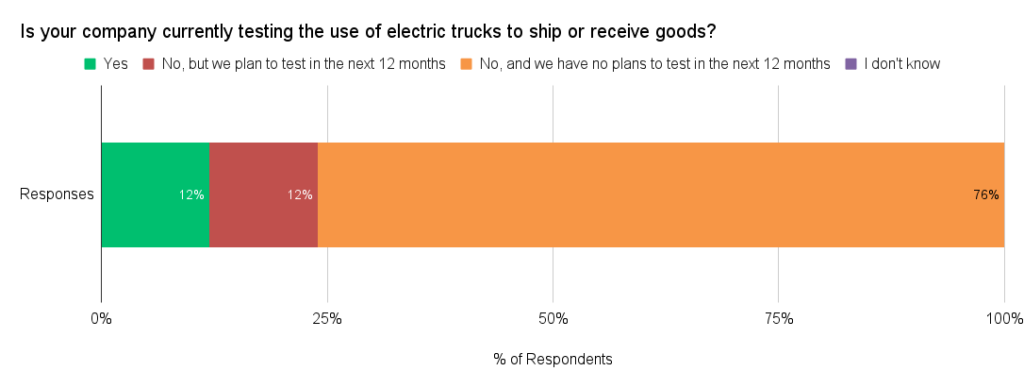In April 2023, one of our Indago members — who are all supply chain and logistics executives from manufacturing, retail, and distribution companies — submitted the following question:
“We see the future of transport moving toward electric and autonomous vehicles. However, ownership, energy sources, and labor relations will change drastically versus the current market structure of shippers, forwarders / brokers / 4PLs, and carriers. How do you see [the future of transport evolving considering these factors]?”
We surveyed his peers in our Indago supply chain research community and only 12% of the respondents at the time were testing the use of electric trucks to ship or receive goods, and 76% had no plans to test them in the next 12 months. Meanwhile, 0% of the respondents were using autonomous trucks and 92% had no plans to test them in the next 12 months.


“I do not agree with the statement ‘the future of transport will be electric and autonomous,’” said one executive. “Recent experiences have shown that our road networks are simply not ready for autonomous vehicles (e.g., Google & Tesla). Truck transportation might convert to electric on some hauls, but not 100%. Given that major investment in road networks [will be required] to accommodate electric and autonomous vehicles in terms of infrastructures and security measures, I tend to believe this will not be a reality for many parts of the world.”
Another executive commented, “We utilize electric trucks for local shuttle operations between the plant and DC. We would like to utilize electric trucks for additional inbound and outbound movements but are constrained by the limited range of the trucks.”
We also asked our Indago members, “How large of a role do you believe electric trucks and autonomous trucks will have in your transportation operations by 2030?”
More than a third of the respondents (36%) believe electric trucks will have a “Very Large” (12%) or “Large” (24%) role in their transportation operations by 2030. In contrast, only 8% believe autonomous trucks will have a “Large” role in their transportation operations by 2030.

“We know [autonomous trucks] are coming, however, the liability question still needs to be answered,” said one executive. “The age-old question, who is responsible if an autonomous truck crashes into a busload of people? Since no one is actually driving the truck, where would the liability fall? The shipper for loading it? The manufacturer of the truck? The [carrier] that deployed the asset? As excited as I am to see the next generation of technology in the logistics space, I do not expect to experience this technology as a logistics professional. I will hopefully be retired before 2030.”
Here are some other value-added comments from our Indago members:
“Electric is happening, autonomous is not. California regulations are pushing electric trucks despite the enormous cost and infrastructure risk.”
“Truck transportation will evolve organically, over time, because of market economics. That is, as electric and autonomous trucks become more cost-effective, adoption will grow.”
“I believe certain parts of the operation lend itself to autonomous and electric transportation. For example, I believe that yard tractors can easily be autonomous and perform very well. Autonomous trucks can also be used for long-haul OTR routes; however, using them for ‘final mile’ delivery would be difficult. Having a large drop lot close to an interstate exit ramp would allow a company to have autonomous trucks handle the 90% OTR component with relative ease, and have human drivers take the trailers from the drop lot to the final destination. This combination would allow a ‘sweet spot’ solution for a company to gain massive benefits without having to wait for the trucks to be able to travel city streets without incident.”
What do you see as the biggest obstacles to using electric trucks for freight transportation at this time? For insights on that question and more, download the report.
How do you see the future of truck transportation evolving? Do you agree that the future will be electric and autonomous? What actions (if any) are you taking to prepare for the future transportation environment you expect? Post a comment and share your perspective!
Be Uncommon. Research with Purpose.
If you’re a supply chain or logistics practitioner from a manufacturing, retail, or distribution company — and you’re interested in learning from your peers — I encourage you to learn more about Indago and join our research community. It is confidential, there is no cost to join and the time commitment is minimal (2-4 minutes per week) — plus your participation will help support charitable causes like Breakthrough T1D (formerly JDRF), American Logistics Aid Network, American Cancer Society, Feeding America, and Make-A-Wish.
- SEO Powered Content & PR Distribution. Get Amplified Today.
- PlatoData.Network Vertical Generative Ai. Empower Yourself. Access Here.
- PlatoAiStream. Web3 Intelligence. Knowledge Amplified. Access Here.
- PlatoESG. Carbon, CleanTech, Energy, Environment, Solar, Waste Management. Access Here.
- PlatoHealth. Biotech and Clinical Trials Intelligence. Access Here.
- Source: https://talkinglogistics.com/2024/06/13/are-you-using-electric-or-autonomous-trucks-in-your-transportation-operations/



